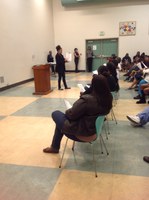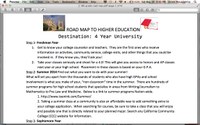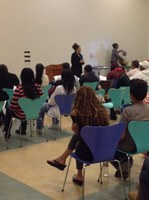Project 4: College Readiness Parent Workshops
OVERVIEW & RATIONALE—
The vision of my school site and the overall charter organization is to “Prepare all students to attend the top 100 colleges and universities”, yet based on data and resources, this vision is going to need  extensive support if it is to ring true in the lives of our students. Through informal conversations with staff members and a survey given to all of my eighth grade students, it was clear that college conversations had not taken place at an effective rate. Many students did not understand the terms college and university nor did students indicate that they knew what it takes to get to college. In rebuilding the school culture, much emphasis was placed on keeping parents and students up-to-date on their academic progress. Students and their families were being transitioned from two years of limited communication and extensive challenges to greater structure during the 2012-2013 year. With this adjustment, the emphasis on improved academic performance was heavily, consistently addressed with the 8th grade class as high school was soon arriving. Teachers and administration spoke of being ready
extensive support if it is to ring true in the lives of our students. Through informal conversations with staff members and a survey given to all of my eighth grade students, it was clear that college conversations had not taken place at an effective rate. Many students did not understand the terms college and university nor did students indicate that they knew what it takes to get to college. In rebuilding the school culture, much emphasis was placed on keeping parents and students up-to-date on their academic progress. Students and their families were being transitioned from two years of limited communication and extensive challenges to greater structure during the 2012-2013 year. With this adjustment, the emphasis on improved academic performance was heavily, consistently addressed with the 8th grade class as high school was soon arriving. Teachers and administration spoke of being ready for high school, improving skills, reading at grade level, and being able to succeed in and make it through high school. I wanted to give life to the often mentioned but minimally emphasized college future of our students. Maintaining the vision of the school and organization requires providing access to college in any way possible. Our 8th grade students and parents regularly attended the monthly parent information meetings, so it is here where the first College Information Session took place.
for high school, improving skills, reading at grade level, and being able to succeed in and make it through high school. I wanted to give life to the often mentioned but minimally emphasized college future of our students. Maintaining the vision of the school and organization requires providing access to college in any way possible. Our 8th grade students and parents regularly attended the monthly parent information meetings, so it is here where the first College Information Session took place.
ACTION—
- During the first meeting I presented parents with an outline of A-G courses, college requirements, and how to ensure their students are competitive candidates for college. In the large group of around sixty parents and students, many questions were posed about the meaning and reasoning behind A-G courses, how to ensure their children are able to take the classes listed, and how they could prepare for entrance exams as future ninth grade students.
- In preparation for the follow-up meeting, flyers were sent out through students as well as verbal
 announcements to both students and parent a week prior. This meeting was for 8th grade students and families and I served as the facilitator of an informal conversation. I created a High School road map with class suggestions, summer activities, test preparation, and activity suggestions for parents to draw from. Parents freely asked questions as we chronologically went through college-ready steps for each year of our student’s future high school career.
announcements to both students and parent a week prior. This meeting was for 8th grade students and families and I served as the facilitator of an informal conversation. I created a High School road map with class suggestions, summer activities, test preparation, and activity suggestions for parents to draw from. Parents freely asked questions as we chronologically went through college-ready steps for each year of our student’s future high school career.
REFLECTION—
Collaboration with administration and all building/facilities personnel were the first immediate lessons from the initial meeting. Ensuring the time allotted for the room coincides with rest of the campus could have allowed parents to have more questions answered during the first meeting. This, however, led to the smaller, 8th grade parent meeting which allowed parents to get all of their academic, as well as social and financial questions answered not just by me, but by other parents as well. Based on parent feedback, the workshop provided details parents found valuable and all who attended requested a subsequent workshop. As a school leader it is imperative to align action with vision, while also listening to the needs and concerns of families’. Informational, but discussion based meetings with families displays care and genuine belief in the mission of preparing students for college success.
Connection to CPSELs
CPSEL 1
Facilitating the development, articulation, implementation, and stewardship of a vision of learning that is shared and supported by the school community.
- 1.2 Plan and implement activities around the vision
- 1.3 Allocate resources to support the vision
CPSEL 4
Collaborating with families and community members, responding to diverse community interests and needs, and mobilizing community resources.
- 4.1 Collaborate to incorporate the perspective of families and community members

